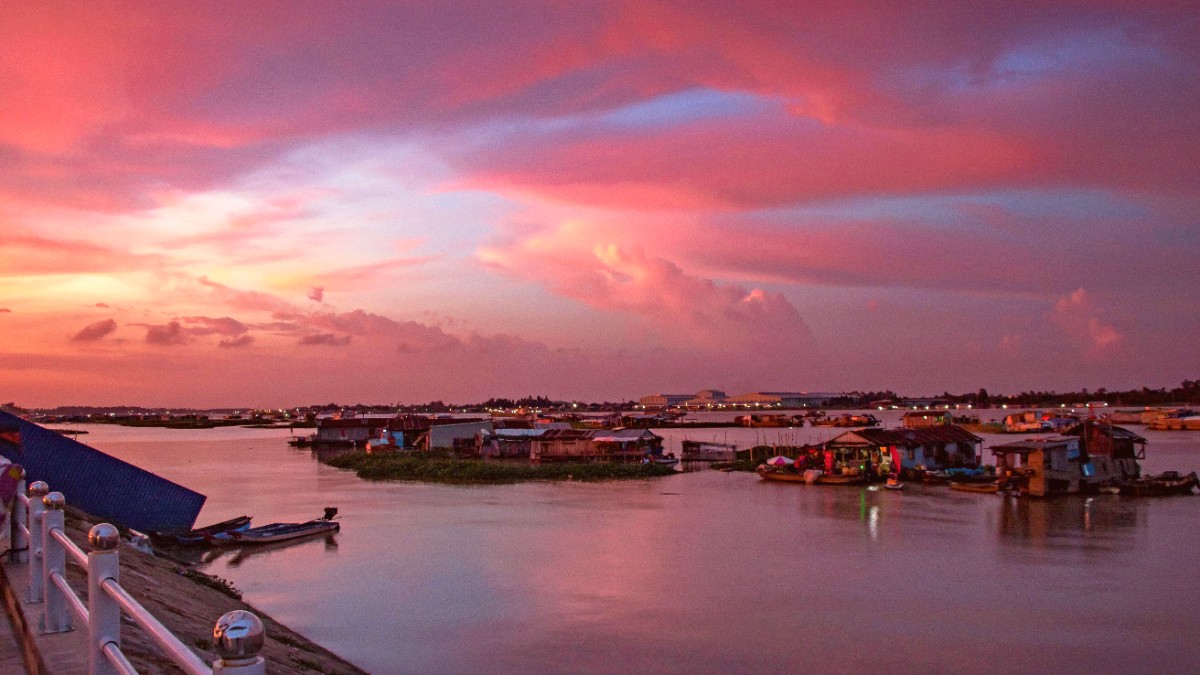
Mekong Delta, Vietnam
This period features consistently pleasant weather. Average daily temperatures range from 25°C to 30°C (77°F to 86°F). Humidity levels are low. Expect abundant sunshine and minimal rainfall. This weather creates ideal conditions for beach activities and outdoor exploration.
Temperatures during the wet season remain similar, typically ranging from 26°C to 32°C (79°F to 90°F). Humidity is high. Daily rainfall is frequent, often occurring as short, heavy downpours, especially in the afternoons. These showers usually clear quickly, leaving sunshine. Tropical storm activity, including typhoons, is most likely between September and November.
Temperatures during the wet season remain similar, typically ranging from 26°C to 32°C (79°F to 90°F). Humidity is high. Daily rainfall is frequent, often occurring as short, heavy downpours, especially in the afternoons.
These showers usually clear quickly, leaving sunshine. Tropical storm activity, including typhoons, is most likely between September and November. While direct hits on Phu Quoc are less common than on the mainland, these storms bring stronger winds and prolonged rain.
Perfect for beach vacations.
Sunny, dry days with comfortable temperatures and calm seas. All tourist attractions and tours operate at full capacity.
Higher prices for flights and accommodation. Popular spots become crowded.
Often good weather continues or improves.
Crowds are smaller than in peak season. You find better prices for hotels and flights.
Weather can be unpredictable. You might encounter early or late rains.
Significantly lower prices.
Fewer tourists mean more serene experiences. Island landscapes appear lush and green. Waterfalls flow with more volume.
Expect daily heavy rain showers. Seas can be rougher, impacting boat tours and ferry schedules.
Heavy rainfall during the wet season causes localized flooding on some roads, specifically in rural or less developed areas.
Tropical storms or typhoons pose the highest risk between September and November. These disrupt ferry services and flights, so monitor local weather forecasts closely if traveling during this time.
The dry season (November to April) has the clearest visibility and calmest waters, ideal for marine activities.
The dry season offers easier trails due to less mud. The wet season brings lush scenery, but paths are slippery.
These activities are enjoyable year-round, less dependent on specific weather conditions.
Policies can change rapidly. Stay informed on local weather.
Consult a medical professional before travel for health-related guidance.
Requirements vary depending on your nationality and travel plans.
Phu Quoc Island offers a special 30-day visa exemption for travelers of all nationalities. This applies if you arrive directly by air from an international country, without first entering mainland Vietnam. You must also exit Phu Quoc directly to an international destination. This exemption works if Phu Quoc is your only destination in Vietnam.
No specific entry fees apply for the Phu Quoc visa exemption. For Visa on Arrival, you pay a stamping fee (e.g., $25 USD) at the airport upon arrival. E-Visa fees are paid online ($25 USD).
Costs vary greatly depending on your travel style.
This section covers important medical and safety guidelines.
Drink only bottled or purified water. Avoid ice made from tap water. Eat hot, freshly cooked food. Peel fruits yourself.
For prevention, carry Imodium A-D Caplets or similar Anti-diarrhea medication. Use Sawyer Products Picaridin Insect Repellent. Apply repellent, especially at dawn and dusk. Wear long sleeves and pants in the evenings. Use mosquito nets if your accommodation provides them.
Vinmec Phu Quoc International Hospital is a modern, well-equipped facility. Smaller public hospitals and clinics are also available in Duong Dong. Pharmacies are found in Duong Dong town for over-the-counter medications.
Vinmec offers international standard services.
Emergency numbers: 115 (medical), 113 (police), 114 (fire). English may be limited.
Tap water in Phu Quoc is NOT safe for drinking. Only consume bottled water. Consider carrying a LifeStraw Filter Water Bottle for sustainability.
Always use bottled water for drinking and brushing teeth.
Eat at busy establishments. Avoid raw salads or unpeeled fruits from questionable sources.
Phu Quoc is generally safe. Petty crime like bag snatching can occur, common in crowded areas of Duong Dong or at the night market.
Stay aware of your surroundings. Keep valuables secure and out of sight.
Typhoons (Sept-Nov) cause heavy rain, winds, and rough seas, disrupting travel. Jellyfish are present in coastal waters.
| Category | Contact | Number |
|---|---|---|
| Medical Emergency | Ambulance | 115 |
| Police | Local Police | 113 |
| Fire | Fire Department | 114 |